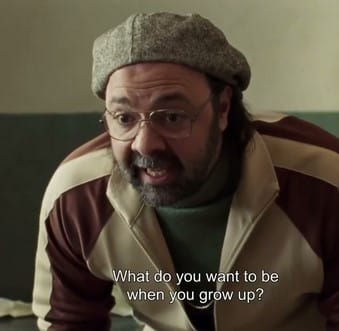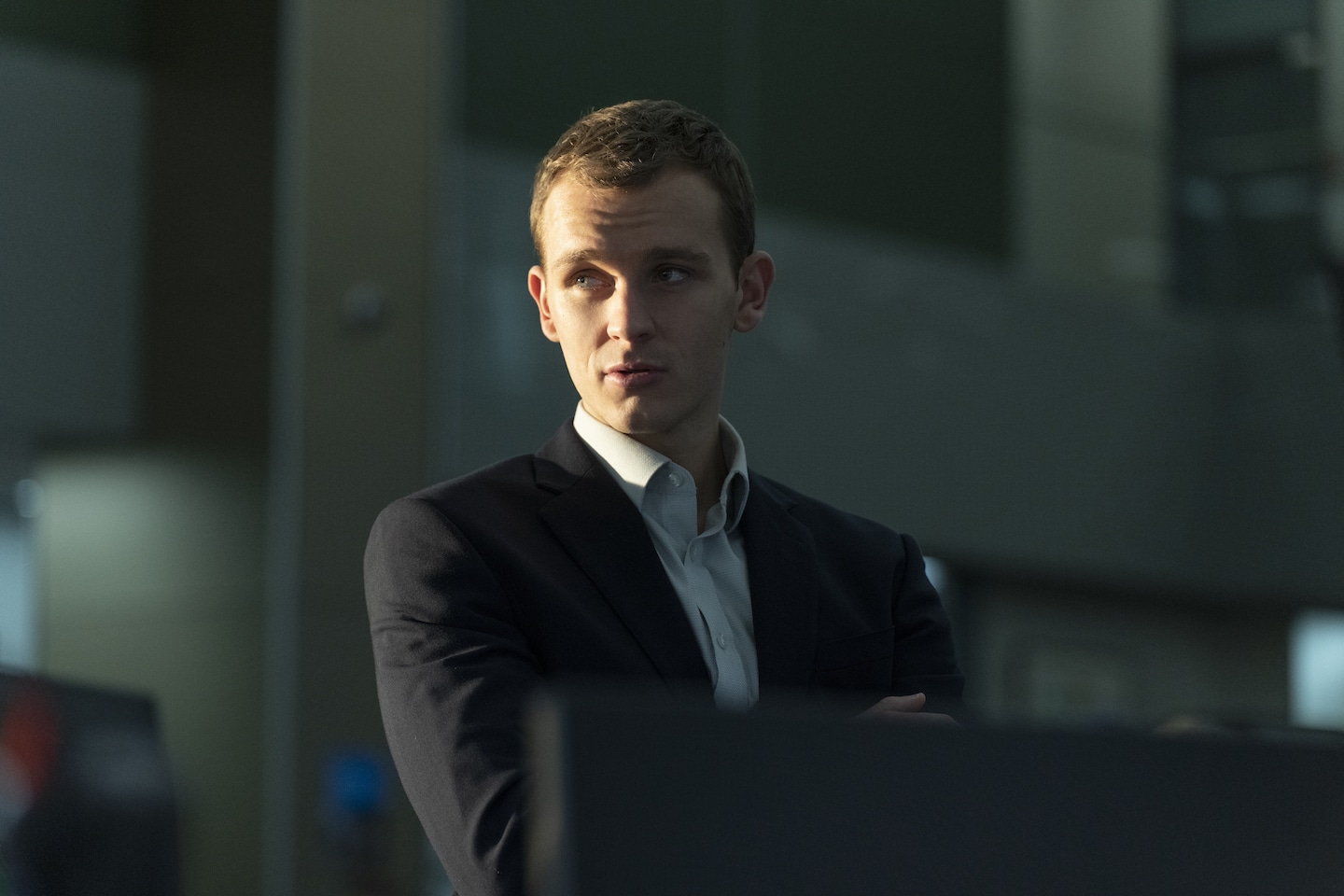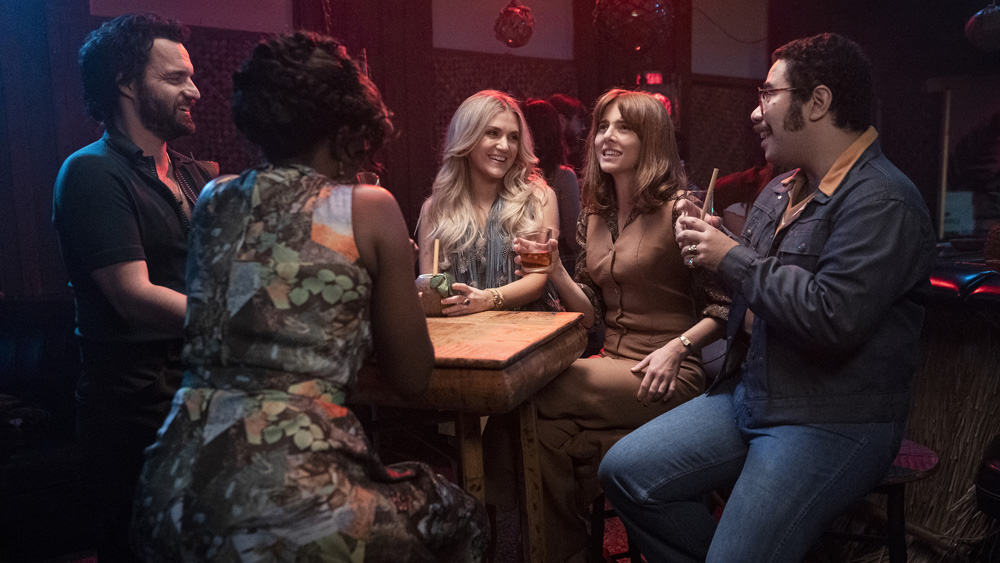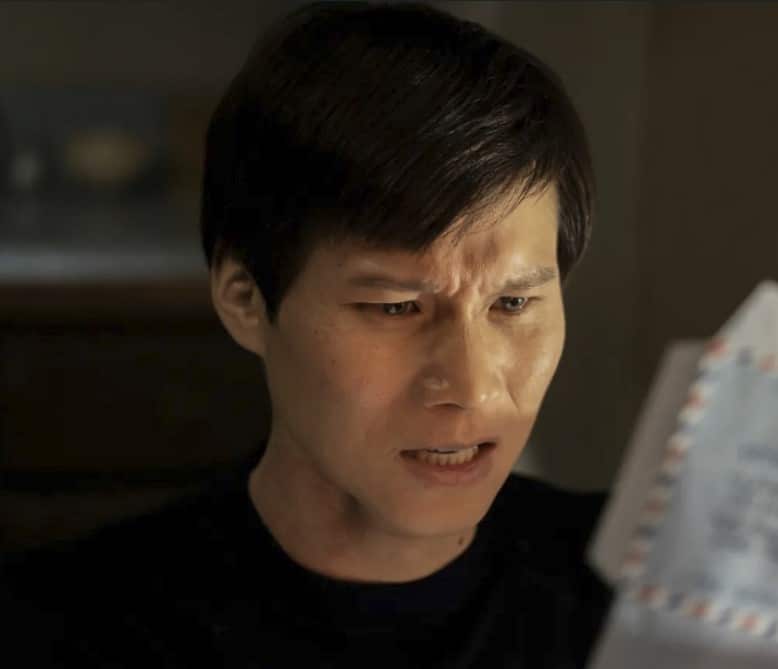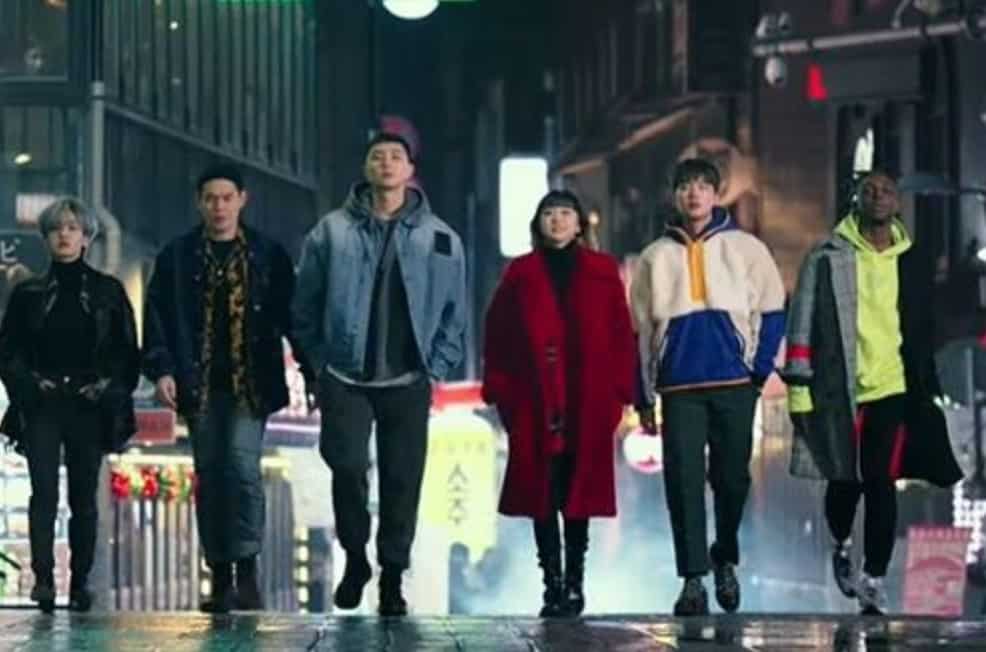Watercooler Pick
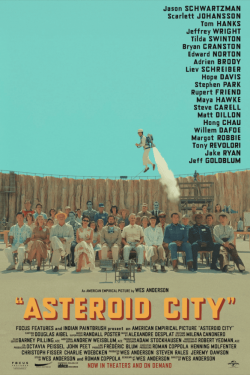
Asteroid City
- Movie
- Where to Find It: theaters, vod
- Rating: PG-13
- Release Date: June 23, 2023
- Runtime: 1 hour 45 minutes
Recommended by:
Share on social media
Find More Watercooler Picks

Wes Anderson’s 11th film, Asteroid City follows one Augie (Jason Schwartzman), a recently-widowed war photographer, as he navigates through the complex galaxies of love, loss, and alien invasion. He’s joined by a fittingly star-studded cast of Anderson newbies and returnees, including Maya Hawke as a teacher (June), Scarlett Johansson as a superstar actress (Midge), and Tom Hanks as Augie’s father-in-law (Stanley).
Set over the course of 9 days in the blistering heat of the Nevada desert, Asteroid City’s main plot concerns an astronomy event for aspiring young “brainiacs.” Among these juniors are Augie’s son, Woodrow (Jack Ryan) and Midge’s daughter, Dinah (Grace Edwards) – a comically-intelligent, awkwardly-infatuated duo who drive the story while their parents are off-screen. Just scenes into the film, Augie, cremated remains in hand, reveals to Woodrow that his mother has passed away. While the two (and Woodrow’s three younger sisters) share no words of comfort or solace at the time, this event defines the tone of Asteroid City, silently controlling each action taken and each line spoken throughout the film.
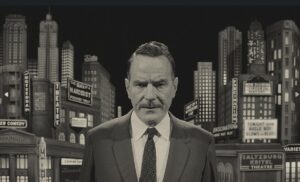
It’s important to note that Augies’s story is the bottom layer in a series of mediums, which make Asteroid City a charmingly convoluted film. The descent to his tale begins with a television host (Brian Cranston), who introduces a nightly special offering a glimpse into the creation of the modern play. The star of that play is genius writer Conrad Earp (Edward Norton), who is working on what will become his final masterpiece: “Asteroid City.” As Earp introduces his cast of characters, the black-and-white of the 50s-era TV special explodes into color and the title sequence of our Asteroid City rolls. Throughout the movie, the stunning color of the Nevada desert cuts back to the monochrome broadcast, and the “Asteroid City” actors, now playing themselves, play in scenes depicting the creation of the imaginary show. This layering makes for shocking 4th wall breaks and fun narrative blurring, including discussions of events ages before they actually occur.
Perhaps the biggest cast of movie stars in any Wes Anderson film to date, Hanks, Johansson, Cranston, and Norton are joined by appearances from Margot Robbie, Steve Carell, Jeffrey Wright, Willem Dafoe, Adrien Brody, Hope Davis, Liev Schreiber, Jeff Goldblum, and some up and comers.
Asteroid City is colorful, original, and relentless. Its costuming is elegant, its tone shifts are palpable, and it features a stellar soundtrack that includes an original banjo number. There may be a lack of narrative depth, but the film is pleasing to the eyes and satisfying to the mind, as its main cast enjoys obvious arcs and frequent romantic payoffs.
 As is common in Anderson’s style, Asteroid City’s dialogue is rapid-fire and unemotional, a tone that lends itself well to Augie and Midge, cool-headed, sharp-shooters at first glance who bond over photoshoots – Augie as the photographer, Midge as the subject – and their shared, aching grief. Together, they imbue Asteroid City with a sense of meaning — at least, somewhat. The truth is that, unlike some of Anderson’s masterpiece films (see Moonrise Kingdom, Rushmore, and The Grand Budapest Hotel), Asteroid City isn’t exactly sure what it wants to tell its audience. The pieces are on the table for profundity — an aching widower, grieving children, a movie star destroyed by the “violent men” in her life — and yet, the film didn’t strike me as profound at all. Asteroid City is certainly about the process of feeling and the journey to understanding grief, but it doesn’t have much to say.
As is common in Anderson’s style, Asteroid City’s dialogue is rapid-fire and unemotional, a tone that lends itself well to Augie and Midge, cool-headed, sharp-shooters at first glance who bond over photoshoots – Augie as the photographer, Midge as the subject – and their shared, aching grief. Together, they imbue Asteroid City with a sense of meaning — at least, somewhat. The truth is that, unlike some of Anderson’s masterpiece films (see Moonrise Kingdom, Rushmore, and The Grand Budapest Hotel), Asteroid City isn’t exactly sure what it wants to tell its audience. The pieces are on the table for profundity — an aching widower, grieving children, a movie star destroyed by the “violent men” in her life — and yet, the film didn’t strike me as profound at all. Asteroid City is certainly about the process of feeling and the journey to understanding grief, but it doesn’t have much to say.
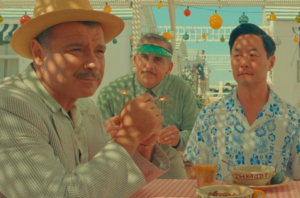 In typical Andersonian fashion, Asteroid City falls neatly outside of generic lines, elegantly dodging the question of exactly what it wants to be. Advertised as something of a sci-fi flick, its actual science is practically nonexistent, amounting to little more than thrown jargon, laser guns, and dimwit technicians in lab coats. In recent weeks, Asteroid City reviewers have taken to the term dramedy, with New York Times staff writers describing it as “comic and often wry” with “the soul of a tragedy.” The entire film is, indeed, permeated by a painful, indomitable sadness, which is beautified and filled with irony against colorful sets and the bright-desert sun.
In typical Andersonian fashion, Asteroid City falls neatly outside of generic lines, elegantly dodging the question of exactly what it wants to be. Advertised as something of a sci-fi flick, its actual science is practically nonexistent, amounting to little more than thrown jargon, laser guns, and dimwit technicians in lab coats. In recent weeks, Asteroid City reviewers have taken to the term dramedy, with New York Times staff writers describing it as “comic and often wry” with “the soul of a tragedy.” The entire film is, indeed, permeated by a painful, indomitable sadness, which is beautified and filled with irony against colorful sets and the bright-desert sun.
Like all Anderson films, Asteroid City is a treat for the eyes, with a distinct color scheme (blues, oranges, whites), visual motifs, and old-school pop culture references that become treasure hunts by the movie’s end (keep an eye out for Road Runner and Superman). Romance abounds, as the film’s main cast finds themselves falling in unmistakable love as the story progresses. Although some of these threads end unsatisfyingly, they make for fun moments and a likable cast of characters.
At a pivotal point in Asteroid City’s second-half, playwright Conrad Earp remarks that he never figured out what his arguably most important scene means. When he’s asked, he’s not dismissive or defensive, but rather, eager to find something important to say — something that, in that instant, seems to be just beyond his reach. While this comment is charming,it’s also telling – because, in that scene, Earp is Anderson. Asteroid City’s issue isn’t that it lacks finesse or thought — it’s that the careful masterwork which went into creating the film’s aesthetic never came together for its ultimate meaning.
Asteroid City is like a trip to a resort — it’s fun, colorful, outwardly buoyant and a little soulless, a potent combination that makes it both a pinnacle of Wes Anderson’s style and a slight miss as a narrative picture. The film offers things to think about, emotions to feel, and characters to relate to, but doesn’t bring them together in a satisfying way.
Families (teens on up), young adults, and long-time Anderson fans will want to see it on the big screen before it’s too late.
Because of its reliance on the grandiose, I imagine this film will not hold up as well once it hits streaming.
- Moods: stretch my mind, take me back, transport me
- Interests: original, romance, star power
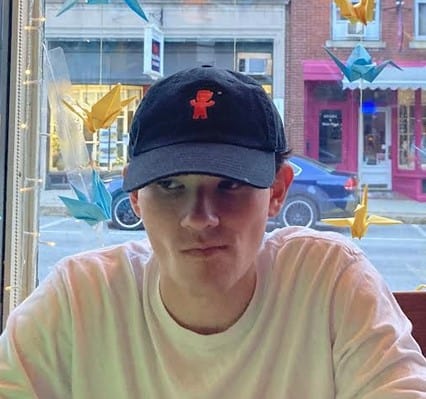
Aaron Cohen



